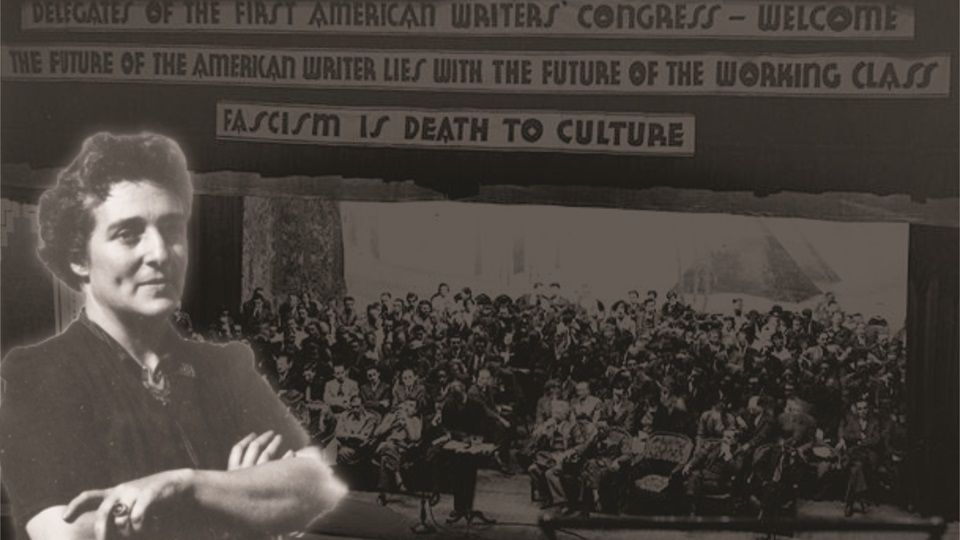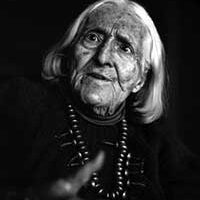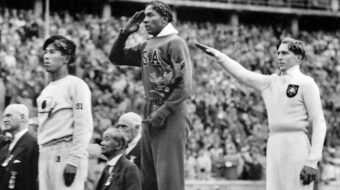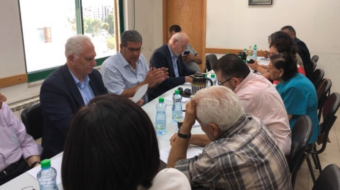
Introduction by Taylor Dorrell
At one point in the 1930s, Meridel Le Sueur—an American writer associated with the proletarian literature movement of Depression years—lived in a single room in Minnesota with her two children. Here, she likely reflected on the criticisms made by some of her female colleagues who, as active organizers, were not excited about the idea of bearing children.
Journalist and Communist Party member Anna Louis Strong, for instance, reportedly disagreed with Le Sueur’s choice to have children, a decision Le Sueur made while sitting in jail after being arrested for protesting the Sacco and Vanzetti executions as a way of “giving a gift” to herself and a world that didn’t want it.
Le Sueur’s customary practice in those days was to, after a long day of work at odd jobs, dip her head in the sink, run cold water on her face, then write until fatigue slowed her to a hazy halt. In this decade, she wrote over two dozen reported articles, almost 30 short stories, the book Worker Writers, the novel The Girl, and articles she wrote for Vogue and Harper’s Bazaar.
By the end of the 1930s, she’d made it out of the single-room living and was praised as a writer who, with determination and fervor, synthesized feminism, communism, and the often neglected subject in Communist circles, Midwest Regionalism.
With the Great Depression and the rise of fascism in that decade, cultural workers had to choose sides. Writers like Jack Conroy and Richard Wright, both of whom Le Sueur met through John Reed clubs, chose the side of the anti-fascist proletariat. With the popular front period naturally came a writers’ contingent, culminating with the 1935 American Writers Congress, an event with dozens of famous writers from the U.S., Latin America, and Europe.
At the congress, writers ranging from John Dos Passos to Langston Hughes spoke about literature and how it can serve the people. In the introduction, Henry Hart points to two problems: the effectiveness of political action against fascism and war and the methods and subjects that writers can implement to help them win. “The revolutionary spirit is penetrating the ranks of the creative writers,” he said, “Never have the writers of the nation come together for fundamental discussion.”
Le Sueur’s speech at the congress was the only one given by a woman, although many women were in attendance. Her focus was on proletarian literature and the Midwest, a combination that wasn’t out of the norm for Midwesterners—the Midwest birthed Socialists and Communists, spanning from Indiana’s anti-war presidential candidate Eugene Debs to Cleveland’s C.E. Ruthenberg, the founder of the Communist Party—but regionalism wasn’t prioritized by the Communist Party in a time of international mobilization against fascism.
And so, her speech and works remain to be unearthed in service of a new radical regionalism today. In this speech, published in full here for the first time since it appeared in a 1935 book on the congress released by International Publishers and on the anniversary of her passing, Le Sueur calls for a “revolution” in Midwestern culture that “can spring up from the windy prairie as naturally as the wheat.”
Proletarian Literature and the Middle West
By Meridel Le Sueur
The prairie of the Middle West is very large. Nothing has ever been rooted there. Now it is blowing away because nothing has been rooted there to hold the soil into the earth. The rooted things have been torn up by the greed for lumber, coal, iron, railroads, and wheat. Man has not been rooted in it either.
Coming here I came slowly through Pennsylvania and New York, and there is a deep way that the houses are rooted in the soil. In the Middle West, I have never seen such houses. Out there you look down the road and you see a house going down the road. Someone has decided to move with their house. It is a common sight. At the present time, you can see whole villages of farmers being moved from one part of the country to the other. My family for two generations has moved from place to place, something better farther on, something opening up. All the itching feet, renegades, and banshees from the East came to the Middle West and we have been howling to the moon ever since, wanting something.
The hills where the great wheat and railroad kings live have been built with thousands of lives of workers. Nowhere in America are the ravages of laissez faire colonization so apparent as in the Middle West. Banks, watered stock, and trick practices, have driven the worker and the petty bourgeoisie over the prairies like sheep going from one town to another, going from industry to the farm, and from the farm to industry, and being milked dry. Whole villages have been incorporated by shysters, immigrants brought from the old country and the village then bankrupted, and the people wandering on to be fleeced in a better climate.
This has been going on not only since the depression but for seventy-five years. We have always been depressed. My grandfather surveyed half of Illinois and became so ill at the sharp practices of the government in getting worker immigrants for cheap labor and swift fleecing, that he got drunk and sat in a cornfield in Iowa for two years without speaking. He was buried with a picture of Ingersoll on his coffin and left a notebook which said that Jeffersonian democracy was a failure and it wasn’t going to turn out that every man would have land and the vote.
In the Middle West, there are entire villages ravaged since the passing of the lumber industry. There are thousands of families, men who were the fellers, whistle punks, who have been sitting in a wasteland since the last of the lumber barons passed, as a most awful testimonial to one of the worst and swiftest exploitations that the world has ever known, when the Middle West, a rich fertile sleeping valley, was, in the space of practically fifty years, laid waste.
The wealth that was thus accumulated in so piratical a fashion has not even supported a culture or maintained for itself an American clown, or painter, writer, or poet. Our wealthy houses are full of phony paintings by Rembrandt, Titian, and obscure painters with long Italian names. The furniture is of the court of Louis, and only English novels are bought to this day. This wealthy class of robbers has not even supported the pretense of a native culture.
There is only one class that has begun to produce a mid-Western culture, and that is the growing yeast of the revolutionary working class arising on the Mesaba range, the wheat belt, the coal fields of Illinois, the blown and ravaged land of the Dakotas, the four mills, the granaries. In these places the first unity of action, and of communal expression, is being made between the farmer and the industrial worker on the militant front of struggle.
It is from the working class that the use and function of native language is slowly being built in such books as those of James Farrell with the composition and the colloquialism of the streets of Chicago; of Jack Conroy with his worker heroes going from the automobile industry in Detroit to the coal fields; of Nelson Algren, and of the worker-writers in the Farmers’ Weekly, in the Western Worker.
This is not something in the Middle West that has suddenly grown up, or that is merely a concomitant of a passing depression. This is something that has been bred in our bones for two generations, that has cut the jawbone a little sharper. This is the slow beginning of a culture, the slow and wonderful accumulation of an experience that has hitherto been unspoken, that has been a gigantic movement of labor, the swing down of the pick, the ax that has made no sound but now is being heard.
I remember when I was about twelve years old I lived in a scorched town in Kansas and I went to Kansas City to spend the summer. I was reading Hawthorne, Emerson, and Poe and they seemed pretty strange and alien to the prairie horizon. But there I saw something that was not so alien. I saw a little handful of men sitting in a room and I had never seen so much smoke and talk and such faces. They had just come in from the wheat fields and they were going to talk and study all winter. They were IWWs—they were Earl Browder and Bill Browder, a little man with a mustache and a cane whose name was Charles Ashleigh, and Billy Williams and others, many others; they came and they went and they talked. This was a beginning for many of us. This was like a seed that was being planted in the dark in many separate places and now it is here coming into growth.
In the Middle West, I think we try not to forget the IWWs. They spoke an American language, not an English. Many of them were anarchists, many of them were only haters of the machine, but they started something. Like Johnny Appleseed who scattered the seed for countless orchards in the Middle West, the IWWs brought countless thumbed copies of Marx.
In the Middle West, an important nucleus for the worker-writer is grouped around the Anvil. There are other groups. Last winter a hundred and fifty women from factory and farm wrote down their great proletarian experience under slight guidance. This was not only a terrific and gigantic experience of an exploited and dispossessed class, it was also, fragmentary perhaps, literature.
Writing is nearer experience than a trade. This is a new and buried body of experience the skilled writer can help draw up and refresh his own knowing at the same time. The emphasis must not be simply on skill and technique, but on a new experience, a communal relationship, and revolutionary ideology.
Criticism is of incalculable value of course, but there are varying pressures of criticisms—a time to hoe, a time to cut down, and a time to wait for rain. Critical judgment like everything else in a transitional period must be swift before the happening, and volatile, and at the same time stern. In the present critical temperature, it seems to me there is danger of intellectual ossification before there has been a complete full and warm statement of chaos. You have to have a rich and powerful chaos for a strong and fertile order.
At this time a new literature is being formed by a subtle event of birth. We are now in the composition of a new event. At the moment of hatching what is needed is heat. Some enthusiastic critics may have the best intentions, but they are like the elephant who felt tender toward the wren’s egg that had been left in the sun and sat on it. We need besides criticism, also love and enthusiasm, so that our literature will not be a dissected corpse before it is hatched.
We have never, in the Middle West, had ease or an indigenous culture. We have been starved since our birth. The exploiting class has not even made a culture for itself. Revolution can spring up from the windy prairie as naturally as the wheat.
We have never been burdened with the old tradition in literature from the old world. Every writer in the Middle West has had to work alone as far as connection with other writers is concerned, therefore he has been in closer contact with the American experience. An integral part of the Middle Western immediate experience is a quick adjustment, during danger, between the farmer, the industrial worker, the brain worker, the writer, the artist. They are forming a steady and quick phalange on the prairie. Now we know where to put down our roots, that have never been put down, that have been waiting through a bad season.
The idealistic duality of the New England culture never did us much good. The event of the rape of America was not to be so subtly obscured in mid-America. We never took very seriously the function of the bourgeois writer to muffle the percussions of an exploitive and continuously more barbarous capitalism.
We, of the petty bourgeoisie and the working class, have been dissenters, individual madmen, anarchists against the machine; but now the Middle Western mind is finding a place, sensing a new and vigorous interrelation between himself and others, which at last will give him the free association from the factual bourgeois and decaying reality to the true subjective image of the communal artist, which already is real in Russia: not the spurious subjectivity of the bourgeois artist of personal defeat, subterfuge and apology, but the subjectivity of the communal root image of a rising class that has no reason for entrenchment and subterfuge, and links him further and deeper to all.
In the Middle West, the center of the reformist demagogy, it is only this united cultural front that can save us from falling into the last hypocrisy of the ruling classes—fascism.
We hope you appreciated this article. At People’s World, we believe news and information should be free and accessible to all, but we need your help. Our journalism is free of corporate influence and paywalls because we are totally reader-supported. Only you, our readers and supporters, make this possible. If you enjoy reading People’s World and the stories we bring you, please support our work by donating or becoming a monthly sustainer today. Thank you!













Comments